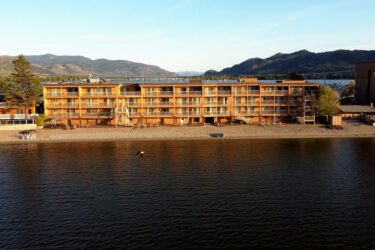
InnVest Hotels acquires The Algonquin Resort St. Andrews by‑the‑Sea, Autograph Collection and The Algonquin Golf Course
InnVest Hotels has acquired The Algonquin Resort St. Andrews by-the-Sea, Autograph Collection and The Algonquin Golf Course.
At a time where all hotel owners are thinking of different and creative ways to deal with this crisis as well as the future, Steve Hedington and Salim Gulamani have some suggestions to assist in discussing your existing loan agreement with your lenders.

By Steve Hedington and Salim Gulamani
What Can I Request From My Hotel Lender?
At a time where all hotel owners are thinking of different and creative ways to deal with this crisis as well as the future, I thought it would be a good idea to discuss a few topics that may assist in discussing your existing loan agreement with your lenders. I will reiterate the main thing right now is to keep in constant contact with your lender, be fully transparent, and provide the information they require.
Most hotel owners are aware that BDC is offering up to $2 million in working capital to hotel owners based on the criteria of business being down compared to the same period last year, which is the case with most hotels. Even if BDC is not your lender, you can still apply for this loan which will be in a second position to your existing mortgage. The payback is over 3 years with the first year being interest only. If you require assistance with this, please do not hesitate to give us a call and we would be glad to work with you.
For this article, I did not think it was necessary to discuss deferring mortgage payments, I wanted to focus on other areas of loan agreements and what can be discussed and requested from your lender. These will benefit owners now, and more importantly going forward since the ramp-up in business is expected to take some time.
For borrowers to make any requests to their lender(s), they should be prepared with current financial, property, market, and brand information as well as business and marketing plans looking ahead. In most cases, account managers at lending institutions do not have the authority to make any changes or formal decisions.
Therefore, borrowers should provide as much information as possible for account managers to make these requests internally. Not only will this provide the lender adequate information, but it will also show the effort and dedication being done on behalf of the borrower.The following list are examples of requests that clients can consider making to their respective lenders. Please note that the following are suggestions and may or may not be considered by their lending institution.
1.Extend Amortization – this is one of the simplest ways in reducing monthly mortgage payments which will come in handy once the deferral of payments has ended. This will be beneficial to those owners who have longer terms remaining on their loans. Owners should keep in mind that the total interest for the life of the loan will increase so this must be considered when choosing this option.
2.Working Capital – in addition to considering the BDC working capital currently being offered, owners should also speak with their existing lenders about this. From our conversations with lenders there are some that will be open to considering these proceeds be used for monthly mortgage payments for a specified period of time. Once again, this will be beneficial in the short term, but will increase the overall mortgage that will have to be paid back.
3.Access to Reserve Funds – there are lenders that require the borrower to submit 4% of total income on a monthly basis towards capital expenditures that may arise during the term of the loan. Borrowers should request the lender to use these funds towards monthly loan payments. The rationale for reserve accounts are to ensure that there are funds available for any capital requirements that arise at the property. Many of these expenses are due to wear/tear and the age of the hotel as well as when the brand requires upgrades to be made. Given today’s environment, all brands are extending the period for these improvements to be completed and so lenders should be able to release these funds to their clients. Borrowers should provide the lender with information that the hotel is in good condition, a list of capital expenditures that have been completed at the hotel over the past couple years, a recent property inspection report from the brand, and a letter from the franchisor that all properties will be allowed additional time to complete any refurbishments.
4.Seasonal Payments– looking ahead to future years, the likelihood is that demand generators that derived most of the business in previous years will be the first to come back. As a result, borrowers should analyze their historical business trends and then request appropriate seasonal mortgage payments for next 2 to 3 years.
5.Extend Interest Only Period– hotels that have opened and will open between 2019 and 2021 will have an issue with dealing with today’s decrease in demand coupled with ramping up business as a newer property. The case can be made that these hotels will require more time to achieve the minimum lender covenants. These hotels should have a plan in place for the next several years to ensure that all measures will be taken to ramp-up business and this information should be shared and discussed with your lender. The information generated should include historical competitive data and demand trends in the market as well as a list of the annual top 20 corporate and group accounts prior to the downturn. These figures will give the lender confidence that the hotel and its ownership have the expertise and track record to generate business going forward.
6.Waive All Annual Fees– in order to reduce upfront fees and do a more detailed analysis of a hotel’s annual performance, lenders will include an annual fee which can be up to $7,500 per year. At a time like this lenders should be requested to waive these or any other annual fees. Though this is not a large expense, it is a cost savings that will add up when combined with other expense items.
7.Updating The Appraisal Report – lenders can include a covenant in the loan agreement that permits them to have the hotel appraised at any time during the term of the loan. If there is any reduction in value that results in an increase in LTV from the commitment letter, the lender can demand the borrower to pay down the loan amount. For instance, if the loan was approved at 60% LTV and the hotel value declines thus increasing the LTV to 72%, the lender can force the borrower to make a cash injection to get the LTV back to 60%. In most cases, lenders will not invoke this covenant at this time, but it is something that should be discussed and even requested in writing from the lender.
8.Refinancing a Maturing Loan – there will be properties whose mortgages will be coming up for renewal in the next few months, and in many ways this may not be a bad thing. Though the borrower will not be able to consider other lending institutions, the existing lender will have to extend the term of the loan (assuming the loan is in good standing). Why is this beneficial? To start, the fixed and variable rates may potentially be lower now than the maturing loan; the amortization can be increased to the original number of years, and on a lesser loan amount this would reduce the monthly payments; the lender will consider an interest only period even though it is a refinancing; and third party fees (legal, ESA, etc.) will be minimal since the lender will have the documentation/reports on file. The downside of refinancing, besides not seeking other lending options, will be that the loan amount will likely remain at the maturing amount and not increased. However, when demand and performance get back to normalized levels and values increase, lenders will be open to increasing these proceeds.
These are suggestions that may benefit you in working with your lending partners. One area that I did not discuss in this article were fixed charge/debt service coverage ratios. I feel that this requires a more detailed definition and discussion which I will provide in our next article. In the meantime, if you have any questions or comments please feel free to contact myself or Steve Hedington and we would be happy to speak with you about this or any other financing matters.



InnVest Hotels has acquired The Algonquin Resort St. Andrews by-the-Sea, Autograph Collection and The Algonquin Golf Course.

The new owners of the famed Windermere House hotel and resort on Muskoka’s Lake Rosseau intend to revitalize the building and its amenities while preserving the property’s historical integrity.

Proactive Hospitality has acquired the Coast Osoyoos Beach Hotel, B.C. CFO Capital arranged acquisition financing for the deal.

Tribute Portfolio – part of Marriott Bonvoy's extraordinary portfolio of 31 hotel brands – continues to grow its global family of characterful hotels with Honeyrose Hotel Montreal, a Tribute Portfolio Hotel, the brand's…